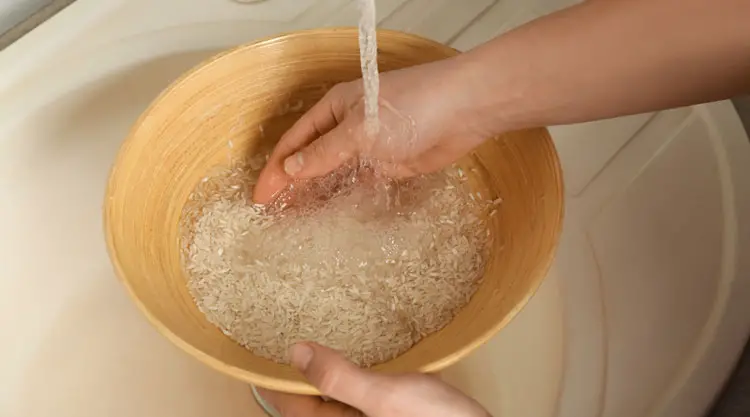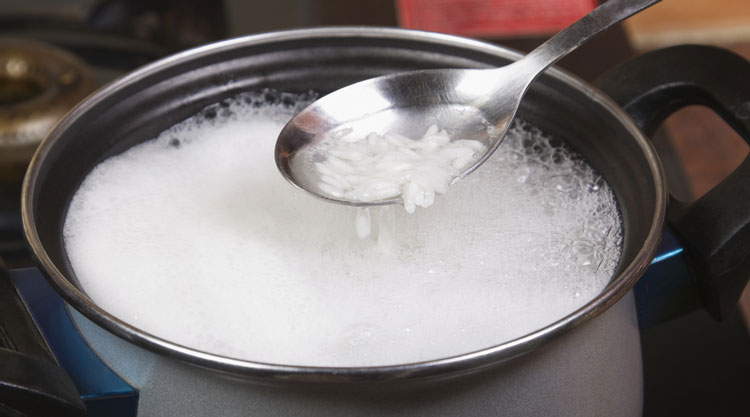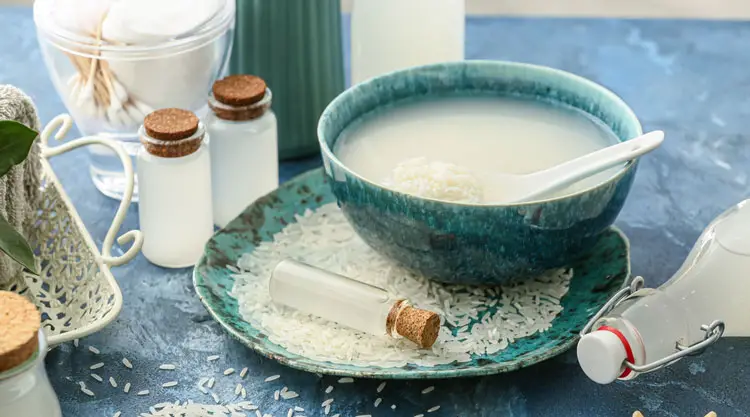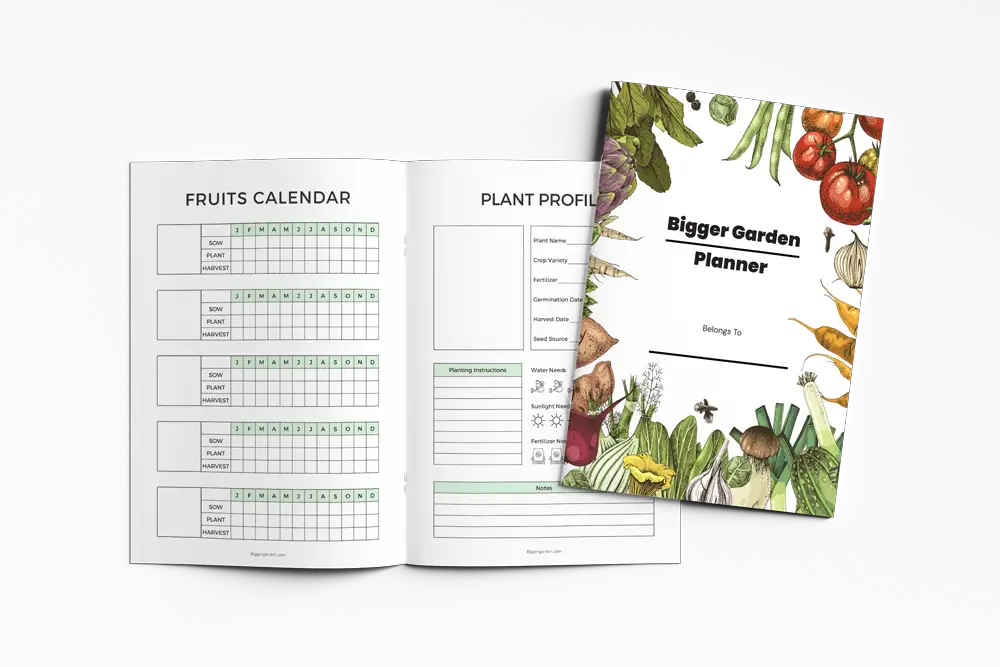Is Rice Water Good For Plants Or Will It Harm Them?

This post follows our research editorial guidelines.

Rice water is one of those home-based remedies people tend to love, it makes good use of something that could otherwise be pored down the drain, but should it be used on your plants? Rice water has nitrogen in it that bacteria in the soil then turns into nitrate which is a curial element for plants to thrive.
You have to be careful though. Not every plant has the proper bacteria to handle this nitrogen and it actually can harm them. For example, if you introduce rice water to your plants, it may actually lead to fungal diseases which will put your plant in a worse condition than when you started using rice water.

Table of Contents
Why is Rice Water Good For Plants?
Rice water has several benefits making it a good addition to your plant care routine, most notably making it easier for your plant to get the necessary nutrients it needs to survive through nitrogen fixation. As long as there was no salt added to the water used for boiling the rice water will not effect the soil PH.
Aside from a quick and easy fertilizer rice water can also be used as a pest-repellent. If you notice an influx of gnats or flies in your garden, you can spray a little bit of rice water on the plant to ward off unwanted bugs. Unfortunately, gnats can eat away at your plant’s soil, simultaneously depleting the majority of its nutrients. Flies aren’t much better as they can feed on the plant and cause discoloration and even death.
What Nutrients Are Found in Rice Water?
There are a number of different nutrients that can be found in rice water that can be beneficial to plants and have uses outside of gardening. For this article, we’re only focusing on the ones that affect plants the most: nitrogen, phosphorus, and potassium. These nutrients encourage good bacteria in the soil like lactobacilli and mycorrhizae to help plant growth. These nutrients work together to ensure the plant grows to be lush and plentiful.
Is Rice Water a Form of Natural Fertilizer?
Rice water contains starch, which is good for fending off diseases. It is also very rich in B6 and B12, which prevents plant cell death. This is one of the biggest benefits of adding rice water to your plant feeding routine because once a plant is diseased, it’s very hard to reverse it, if at all. Simply put, plants cost too much money to let them fall victim to unwanted viruses and diseases.
Furthermore, if rice water is boiled before being added to plants, it can also become rich in Vitamins, B, C, and E. While you can use rice water on your outdoor garden plants, it’s typically recommended more so for indoor plants, including succulents.
Are There Benefits to Adding Rice Water to Your Feeding Routine?
Rice water contains starch, which is good for fending off diseases. It is also very rich in B6 and B12, which prevents plant cell death. This is one of the biggest benefits of adding rice water to your plant feeding routine because once a plant is diseased, it’s very hard to reverse it, if at all. Simply put, plants cost too much money to let them fall victim to unwanted viruses and diseases.
Furthermore, if rice water is boiled before being added to plants, it can also become rich in Vitamins, B, C, and E. While you can use rice water on your outdoor garden plants, it’s typically recommended more so for indoor plants, including succulents.
Cautions to Using Rice Water
Unfortunately, there are also disadvantages of using rice water on your plants. For example, they tend to attract ants and spiders (which homeowners may not like). They also can make your home smell bad, as rice water tends to ferment on warm days.
There are several other risks of using rice water you should know about:

The Heat of Water Being Used
Believe it or not, it’s actually better to use hot water on your plants than cold water because it can kill pests such as aphids and mealybugs, which aren’t easily noticeable to the naked eye. The temperature to kill bugs like these is around 120 degrees Fahrenheit. However, you should never apply hot water directly to the leaves or plant itself because it could kill it. Instead, apply it to the roots, where it can handle the heat and not have any harmful side effects.
The danger with using this method is that you could overwater the roots, causing them to suffocate. Basically, if you choose to use hot rice water, you have to make sure you’re using it correctly.
Bacteria Growth
Rice water can both fight off bacteria, but it also provides food for existing bacteria already in the soil. Sometimes, if you buy a plant from a store, it may not have been properly taken care of. Or, if it was on sale, it may need a little TLC to bring it back to life.
Unfortunately, when a plant isn’t properly cared for, it may lack the nutrients it needs. If you add rice water to already bad soil, it just gives the bacteria something to feed off, so the plant will never truly reap the benefits of it.
Fungus Growth
The same situation mentioned above also applies to fungal growth. If there are already harmful bacteria in your soil, the rice water will make matters worse.
Furthermore, when rice oil ferments in hot temperatures it may lead to fungal issues for flowering plants and vegetable plants that prefer organic substrate soil, which is derived from biological sources like compost.
Over Watering Issues
As mentioned above, adding too much rice water to your plant will cause the water to become water-logged. This essentially deprives your plant of the oxygen it needs to survive. This can also cause your leaves to turn yellow. To avoid this, plant experts agree that you should bottom water your plants, as opposed to any other traditional method.

How Long Will Rice Water Last and How Much Should Be Used?
Generally speaking, rice water can last anywhere from five to seven days. Unfortunately, because it doesn’t have any preservatives, it typically can’t last longer than that. However, that doesn’t mean it can’t expire before that.
Just like with any type of food or liquid, sitting at room temperature for too long can cause it to spoil. If you made some rice water or picked some up from a store and want to use it on your plants, you have several options.
The first is adding rice water to the bottom of your pot. Add about 1” – 1 ½” of water to the bottom of the pot and allow the plant to soak in it for at least 15 minutes. You normally don’t want to exceed 20 minutes, but if the soil isn’t moist yet, you can leave it soaking for a few minutes longer.
The other option is to get a spray bottle and mist the soil and the leaves of your plant. The goal is to get the soil moist, not soaking wet, so use as much rice water until it reaches this moisture level. There really isn’t a wrong or right way to do this. Just don’t forget to mist the underside of the leaves so the entire leaf is moist. You should mist the plant with rice water either in the early morning or late at night to allow the plant to soak up the nutrients. If done in the middle of the day, they could dry out from the midday heat.
Rice Water Alternatives
If you’re looking for some alternatives to rice water, here’s a list of some of our recommendations.
- Green tea
- Potato water
- Coconut water
- Nettle tea
- Dandelion tea
- White vinegar
- Compost tea
- Seaweed tea
- Worm casting tea
If you don’t have rice water available or looking for something a little different to use on your plants, these are all excellent options to try that will ensure healthy plant growth.
Is Pasta Water Similar to Rice Water for Plants?
Earlier we mentioned that boiled rice water has more nutrients that can help your plant flourish, but what about pasta water? After all, they both contain starch. A growing trend on social media saw one influencer using pasta water to water her plants, claiming that she saw impressive growth. And yes – I’m talking about undrained, boiled water you cooked your pasta in. If that sounds weird and you’re pretty skeptical about it, you should be.
According to Jane Perrone, a plant expert, pasta water “…isn’t a substitute for fertilizing during the growing season.” However, she did go on to say that pasta water probably won’t kill your plants either, but only if you use unsalted water.
Just like with sand, you should avoid using anything that has salt in it when it comes to planting and gardening. Salt makes it impossible for roots to absorb water. As such, you should avoid using sandy salt just as much as you should avoid using salty leftover pasta water.
Going back to the social media influencer, she did admit in an interview that she uses traditional gardening methods, along with adding pasta water. It’s up to you if you want to try this trend, but there doesn’t really seem to be any real merit to it.
Final Thoughts
If you want to try rice water for plant growth, these tips can help you do it. Just remember, that as with anything, moderation is key. Rice water is definitely a unique way to fend off plant disease and see your plants flourish.
